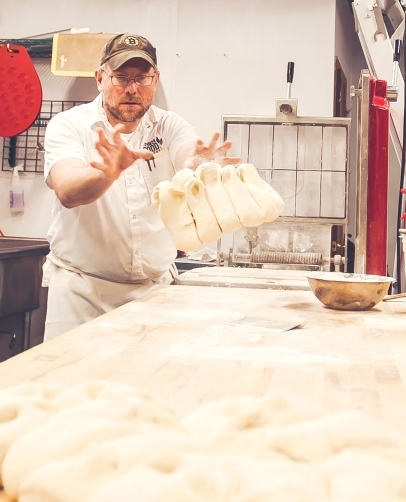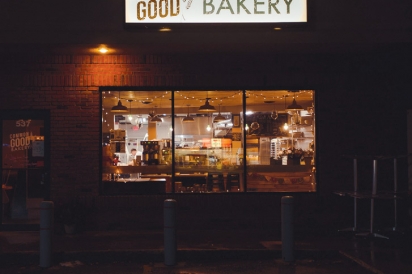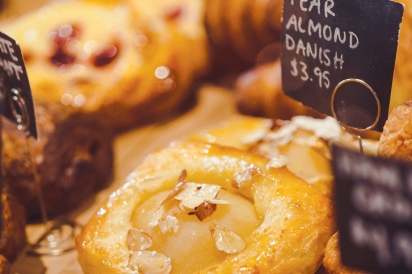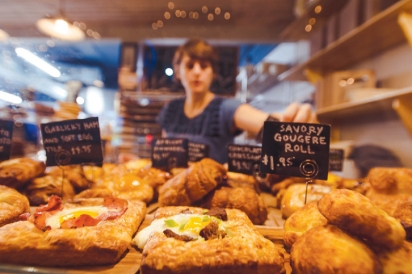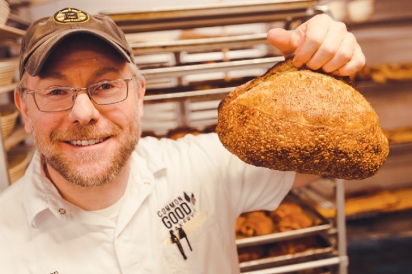Common Good Bakery
Bread ... that this house may never know hunger
It’s 4 in the morning on an edge of Traverse City. The only activity is the noticeable traffic in and out of a brightly lit 7- Eleven store. However, across the street, Jason Gollan has jazz blasting, ovens blazing and is rolling dough. His work is rhythmic and deliberate; steady and precise; measured. The first customers will start arriving at Common Good Bakery in two hours and the morning’s pastries are next for the ovens.
Gollan has been keeping baker’s hours almost daily since August 2017, when he opened Common Good Bakery with the goal of bringing the experience and pleasure of handcrafted bread and pastry to the city and his neighborhood.
“I was completely unsatisfied with the bread available here,” says Gollan. “Not that it isn’t good for what it is, but it wasn’t the techniques and the flavors and textures that I wanted.”
“There are other places to buy baked goods, but there wasn’t anything like this. There was nobody doing laminated pastry from scratch,” he says, referencing the dough he is shaping for the day’s Danishes. Laminated pastries, a Common Good specialty, refers to the technique of splitting into layers a yeast-leavened dough with butter. In the case of his Danishes, doing that 47 times is what is called a turn.
“Dough, butter ... dough, butter ... dough, butter ... and that’s why these are so light and flaky,” he says, describing the layering action of numerous turns of rolling, folding and chilling. The process is labor intensive and requires precision to achieve the daily consistency he desires. For example, there are no shortcuts to the three days it takes to make a handmade croissant or any puff pastry that is built from the layered base. Common Good Bakery offers several varieties that change with the seasons and ingredient availability, with both sweet and savory types put out each day. The signature product Gollan offers is the Morning Bun, which is a cinnamon roll made from croissant dough.
We often anticipate a bakery’s smell—something Common Good Bakery certainly accomplishes—but here the daily visual display is just as mouthwatering. The pastries glisten and shine with toppings like apricots, blueberries or the more savory ham and cheese. The bread and croissants display rich, complex patterns, stemming from Gollan’s preference to push the time in the oven a little longer. He jokes that his signature loaf of bread comes with a handle formed by a crusted fold on top: “‘pursing’ the dough,” he says. The baked goods are not only an expression of himself through the craft but are also part of a genuine approach to making his customers’ days better.
“One of the reasons I wanted to do this is because genuine hospitality is a dying art. Truly trying to make people feel better after they come in and making that be your day, every day,” he says, while generously glazing the insides of a pan of almond croissants with a frangipane.
“If you’re going to be successful as a business owner you have to do something that other people aren’t doing. You have to somehow break through people’s fog of distraction and having a supercomputer in their pocket and their lizard brain firing all the time, and somehow get them to understand that what you are doing is worth coming back for. I try to design something that is unique,” he says.
This isn’t Gollan’s first bakery. He started the popular Crescent Bakery in Frankfort, Michigan, in 2002 before selling it after five years. Prior to that, he worked in bakeries and restaurants for over ten years. He credits much of his baking and hospitality skill to those years, but he also studied at the San Francisco Baking Institute, one of the only schools in America dedicated to education about artisanal bread and pastry.
For Gollan, handmade, craft baking is best learned visually. Although recipes that were once obscure have now become available online with a few clicks, advanced baking techniques are difficult to learn just from a recipe or how-to videos. “Baking is both simple and complex at the same time. Bread is just flour, water, salt and yeast, but it’s what you then do with it that matters,” he says. “Learning is still mainly on-the-job by watching and mimicking.”
Gollan credits his latest success less to his baking experience and more to his going back school to study business. After selling Cresent Bakery he went to one of the only business schools that has a track dedicated to hospitality, suitably named The School of Hospitality Business, at Michigan State.
“I think something a lot of people in my position forget about is ... you still have to have more money left over at the end of the month than when you started. Food is a business. It makes it easier to succeed when you have those ideas in your head,” he says.
At this point, Common Good Bakery serves over 100 customers a day, and at a steadier pace than he saw in the more seasonal economy in Frankfort. A sign of success for him is the daily experience of past customers arriving with a friend or relative in tow. Having repeat customers be excited to introduce the bakery to others is a source of pride for him.
“Our neighborhoods, if they are going to thrive, need cool places to go. I want to build something for the neighborhood,” he says.
Common Good Bakery is open Tuesday through Saturday from 6 AM to 3 PM. In addition to an exploration of rustic bread and pastries, the bakery offers coffee drinks and a breakfast and lunch menu, including daily pizzas. There is also a choice of two bread clubs to join: a Weekly Bread Club Membership and a Rebel’s Bread Club, the latter “for those that don’t like rules.” Both offer discounted bread, free coffee at pickup, $1 baguettes and bread club parties.
Common Good Bakery
537 W. 14th St., Traverse City
231-933-8002 • CommonGoodBakery.com


